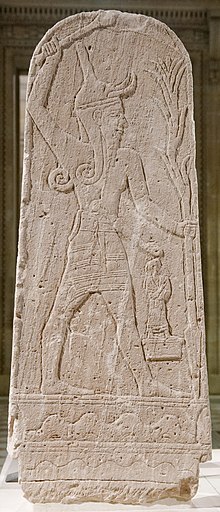Baal
| Baʿal | |
|---|---|
 The stele of Baal with Thunderbolt found in the ruins of Ugarit | |
| Symbol | Bull, ram, thunderbolt |
| Region |
|
| Personal information | |
| Parents |
|
| Siblings | Hebat (in Syrian tradition), Anat |
| Consorts | possibly Anat and/or Athtart[1][2] |
| Offspring | Pidray, Tallay, Arsay[3] |
| Equivalents | |
| Greek equivalent | Zeus |
| Mesopotamian equivalent | Hadad |
| Hurrian equivalent | Teshub |
| Egyptian equivalent | Set |
| Deities of the ancient Near East |
|---|
| Religions of the ancient Near East |
Baal (/ˈbeɪəl, ˈbɑːəl/),[4][a] properly Baʽal,[b] was a title and honorific meaning "owner", "lord" in the Northwest Semitic languages spoken in the Levant during antiquity. From its use among people, it came to be applied to gods.[9] Scholars previously associated the theonym with solar cults and with a variety of unrelated patron deities but inscriptions have shown that the name Baʿal was particularly associated with the storm and fertility god Hadad and his local manifestations.[10]
The Hebrew Bible includes use of the term in reference to various Levantine deities, often with application towards Hadad, who was decried as a false god. That use was taken over into Christianity and Islam, sometimes under the form Beelzebub in demonology.
Etymology[]
The spelling of the English term "Baal" derives from the Greek Báal (Βάαλ which appears in the New Testament[11] and Septuagint,[12] and from its Latinized form Baal, which appears in the Vulgate.[12] These forms in turn derive from the vowel-less Northwest Semitic form BʿL (Phoenician and Punic: WIKI
